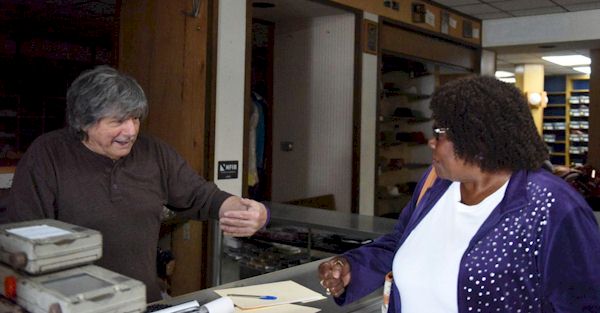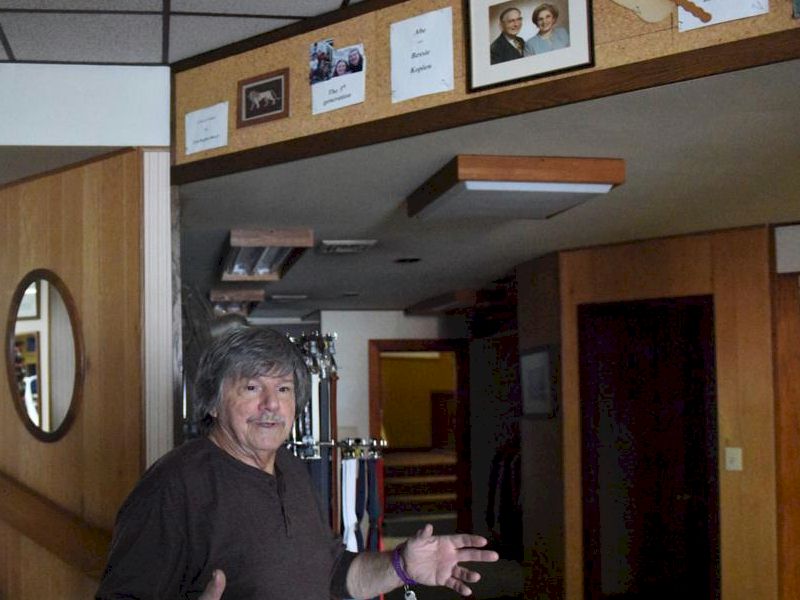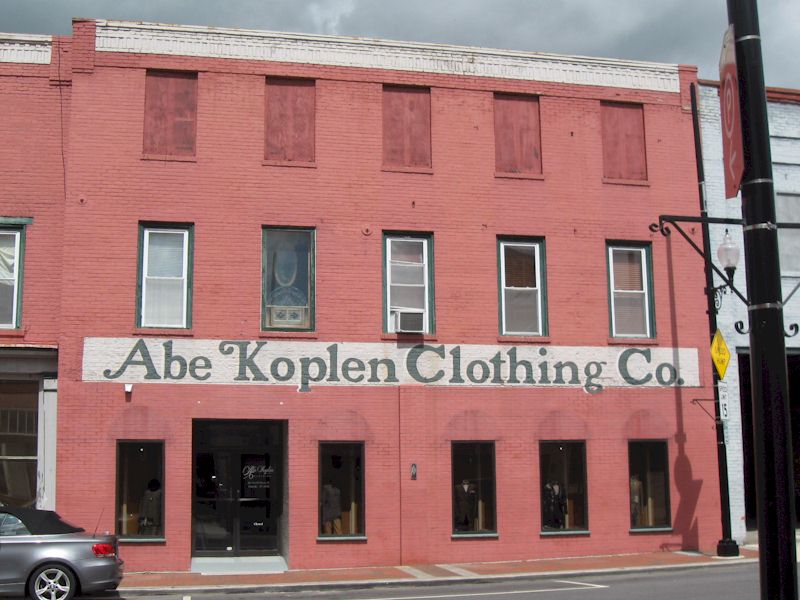Story by guest blogger Barry Koplen. Abe Koplen Clothing Company is located at 215 North Union Street.
When a dear friend and non-family member asked me to write a history of Abe Koplen Clothing, I didn’t reply enthusiastically. Instead, I asked when he wanted me to do it. An ever-patient friend, he implied that I could take my time.
And I have. There was so much to consider, so many aspects, so many powerful emotional responses to sift through.
Of course, regarding the store, my Dad was my mentor. Although he had no text, he taught me by example. For such a fair-minded and regular guy, he was forward thinking in ways that often amazed me. It appeared to me that, in conjunction with my Uncle Herman, his older brother, the two of them made decisions that ensured a bountiful future for them and their families.
For years, I watched as real estate purchases and sales reaped benefits. By means of systematic investing and re-investing, both men ensured comfortable retirements. From my vantage point, I watched as Dad leveraged his profits from the store with considerable success.
That said, Dad was genuinely interested in the well-being of our City. In his own quiet way, he was a driving force for positive change. As President of the RMA, Retail Merchants Association, he helped guide the downtown into prosperity that wasn’t challenged until John Daniel Construction managed to convince the City to help fund the City’s first shopping center.
At that time, both Dad and I saw that as a misuse of City funds because that money had been intended for use for downtown. Both of us knew, according to a very reliable study, that Main Street would be decimated. That disturbed Dad despite the fact that the same study predicted that our block of North Union would NOT be impacted. Our busy block was self-supporting.
At that time, it was useful to reflect on the history of the Koplen stores. Max, our great-grandfather, was a wheeler-dealer who operated out of his long and thin men’s clothing store. My grandfather, Abe, worked with him. Although the store supported both Abe and Max’s families, Abe realized that it could not, in addition, support his older brother, Lawrence.
Lawrence had studied law at UVA but returned to Danville wanting to be a retail merchant in his Dad’s store. Knowing there was too little business to support three families, Abe left to start his own store one block away.
My awareness of the Abe Koplen’s began when I was ten. I worked on Saturdays for $2.00 a day. As young as I was, I never thought to ask about M. Koplen’s store, only a block away. That didn’t happen until I was in high school. Often, I’d walk past or walk into M. Koplen to say hello. Lawrence, Abe’s older brother, was an interesting guy with a terrific sense of humor. Perhaps that’s why his nickname was Uncle Hoppingrass (I’m sure Aunt Mildred could explain!).
Knowing there were two Koplen stores didn’t confuse or confound me. It didn’t seem to be an issue; they had their customers and we had ours. At the time, it didn’t seem to matter that Abe never spoke to Lawrence or vice versa. Likewise, when our family joined Uncle Herman’s at our grandparents’ house for Friday night meals, I never asked why Lawrence and his wife hadn’t been invited.
After all, they lived in a house right across the street from our hopscotch sidewalk in front of Abe and Bessie’s house.
Because M. Koplen’s store appeared to be more genteel, I wasn’t surprised to see different merchandise there than what was sold at Abe Koplen’s. In many ways, Abe’s was a general store that catered to the working class. One of Abe’s best-selling shoes was made by a company known as Sundial; they were brogans, ankle high lace-up work boots that went well with high-back or low-back bib overalls so many men loved to wear.
When my grandfather established the store in the early 1930’s, his advertisements made it seem that his store was both a clothing store and general merchandise store. In addition to plant bed canvas used by farmers who were protecting and nurturing young tobacco plants, Abe also sold Red Fox hosiery, i.e. nylon stockings for women.
On my Saturdays at the store, when I was in high school, I sometimes sold those to the same customers who bought shirts and ties for themselves.
Many of our customers were black farmers. Dad was the only store that opened charge accounts for them and gave them “fall terms;” they were expected to pay the balance of the clothes they’d charged until the fall when they sold their tobacco. Perhaps because tobacco was so central, Dad allowed smoking in the store.
That led to one of our first disagreements. “It makes the clothes smell,” I insisted. “We have to stop cigarette smoking,” I continued, as I pointed to the sizable vestibule just beyond the front door. Worried that tobacco-farming customers would be upset, Pop was reluctant.
But he had stopped smoking too. So he agreed; the store benefitted. Only one customer was offended; he was a noisy white bully of a man who, when asked to discard his cigarette, did so and left the store for good. I think he sold tractors.
By the time I left for college, I noticed that Dad had done some remarkable merchandising; he focused his purchases of merchandise to please the “ethnic trade” in and around Danville. In other words, my absolutely square and normal Dad was selling high fashion clothing that black Americans loved.
Stacy Adams shoes replaced the Sundials. Whereas other stores were reluctant to cater to and welcome black Americans, Dad’s store became a haven. Working there was often fascinating; I heard stories and shared laughter with people who, at the time, were completely segregated from ‘white’ Danville. There were so many wonderful people I met at the store.
One of them was Tom Price. Like me, he was a senior in high school. We always laughed when he said that, “We went to different schools together.” His was the all-black Langston High and mine was the all-white George Washington. Long after college, Tom and I remained friends.
About that time, Dad did something monumental. Of course, to me, it didn’t seem any more unusual than having an M. Koplen up the street. Dad hired a black employee; he was the first retail merchant in Danville to integrate his sales staff.
Every other retail establishment downtown had segregated staffs. That’s why the boycott of downtown merchants did not apply to Abe Koplen’s. Indeed, the store became busier and busier.
Years later, when I asked Dad to explain why he had made that decision to integrate his sales force, his answer was simple. “It was the right thing to do,” he said.
Dad also modernized the store with the help of a professional design firm from Richmond. As a result, the store did even better.
That remained the store’s most substantial change until our next-door neighbor passed away; Dad bought his store and Abe’s expanded. We added a formal wear department and, when I came into the business after college, we began to make tailor made suits—from France!
So much had changed. Long before that, Uncle Hoppingrass and my Grandfather Abe had passed away. In 1971, so did Grandma Bessie. Dad had changed too. He had helped found Tuscarora Golf Course because they welcomed Jews. Golf became a sport he loved.
For a long while, the store did well. Generations of customers continued to shop there. We knew them all as well as we knew their life stories. So many of the area’s black ministers shopped with us; they loved Dad and the wonderful things he had stood for. Most of that never changed.

But there seemed to be fewer and fewer of the truly colorful customers and people Dad took care of.
I’ll never forget a day when I went up to the second floor where we stored lots of merchandise. As I walked past the dress pants, I was startled. It looked as if a dead man was lying across stacks of pants. I hurried downstairs.
“Dad, there’s a dead man upstairs!” I exclaimed.
He motioned for me to speak privately with him near the front of the store. That’s when Dad pointed to W. W. Perrow, a salesman I will never forget. He was raised in the country before he married and moved to the city. In the city, he and his wife bought a small house that still stands next to the new post office. Every spring, he would plant his garden. In his garden, he planted onions.
At noon each day, he went home for lunch. Always, he ate one entire onion with his meal. To say the least, W. W. (we called him Bill), was a card. What I didn’t know was what Dad told me after I’d found the ‘dead man’.
“Bill had a son,” Dad said. “When he was in World War Two, he had suffered a severe head wound. He never recovered. That’s why he began to drink. But he can’t hold his liquor. It makes him fall. Then he gets arrested. I told Bill that it might be better for him to go upstairs and sleep it off.”
I nodded. I had lots more to learn since I’d recently returned from college
Another was when Dad led the charge to save Union Street from the City’s intention to bulldoze the block. Dad won. The City created Memorial Drive instead.
When Dad retired, so many of the families we had served came by the store to wish him well. To so many of them, Dad was a man they would always love, respect, and admire. Knowing I would take over, they wanted me to be just like him.
So did the staff. They never lost their admiration and their affection for Dad. He was the personification of Abe’s.
Bed ridden on the day before he died, while he was still conscious, each person who worked at the store went to Dad’s bedside to say their last goodbyes. I did too.
Like them, I knew that, when he was gone, Abe Koplen Clothing would never be the same.
That’s one reason why, when the reporter came to interview me about the store’s closing, I introduced him to our store’s ‘history wall’. Pictures and artifacts span all four generations. Some of the pieces, including a signed receipt by Max, are over 100 years old.

Although I knew the end of Abe Koplen’s had to come, my hope has been that the memories of the store, its staff and its customers, will never fade away.

Thanks for this story. I love to visit Danville when I drive from Chapel Hill to Bristol. I was delighted when I drove past the department store, it definitely jumped out at me! Thanks for sharing this wonderful southern Jewish mercantile history.
Sending hugs for your kind toughts…
Thanks, Carla, for your kind words. Not long after I was told that our Koplen store would close, I wrote this piece. That writing was done in one sitting, hurriedly, in anticipation of tears to come that would have drained me. And they did. Many have come to see me, to offer fond farewells. Because I had so little warning about the closing, I had made no plans to offer the store to another business. Knowing that repairs were necessary, I immediately began. Each day ends with my exhaustion. By renovating the store, I hope that it will continue to be an active attraction. If ever you visit our town, please allow me to give you a personal tour…
I am reading/writing from a small town in California. I’ve never seen Koplen’s or been to Danville, but your story resonates with me . Small towns and small businesses are the back bone of our country and it is a loss to all of us when small town businesses close. I will miss you from afar.
What a great story. I’m hoping someone can try to fit the Koplan store ideals into their future.